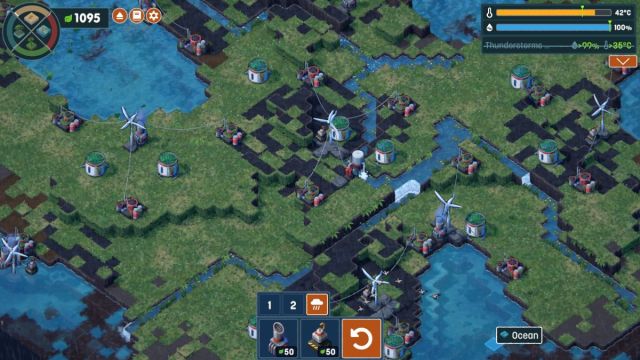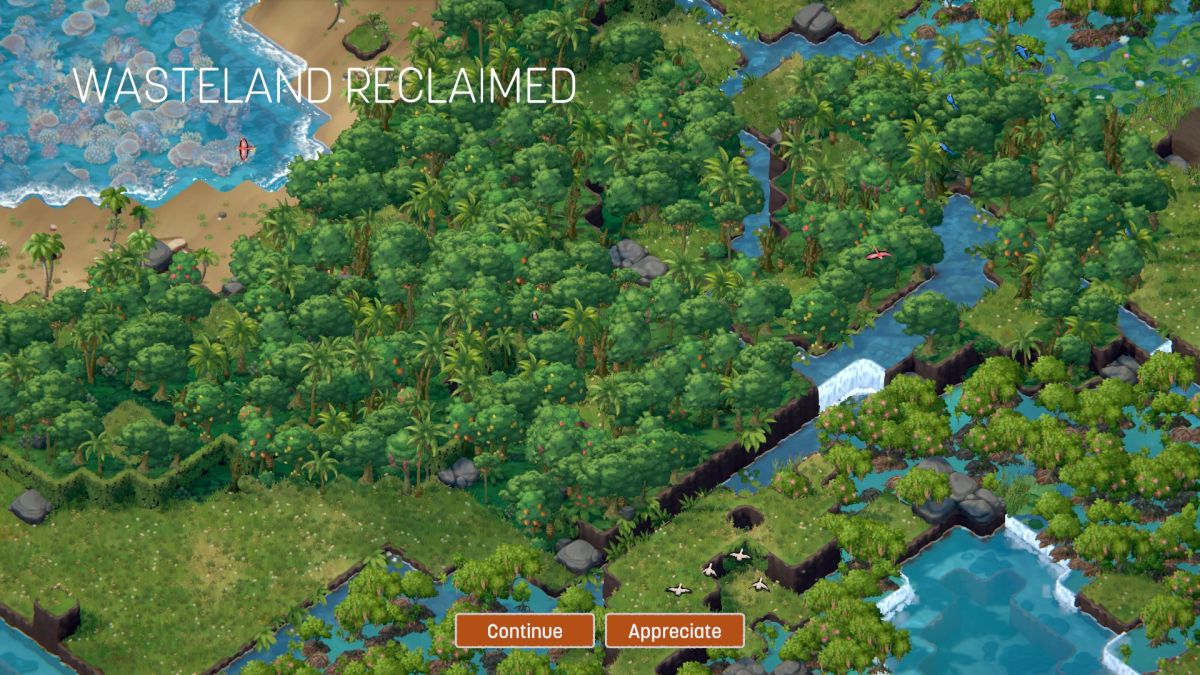Going green
Everything on the earth is a wasteland. All is left to dust and ash, and by the time the player enters the frame in Terra Nil, all that’s green is gone. There is nothing left to do but rebuild. And it’s in restoring nature, in unpacking the very idea of a city-builder, that Terra Nil finds a smart twist on a traditional foundation.
It’s fun to think that the same team behind Broforce and Genital Jousting made Terra Nil. It’s not that I don’t think a studio that’s made games about bros and dicks can’t also make a game about ecological restoration. But Terra Nil sees Free Live exploring an incredibly serene approach to puzzles and city-building. Free Lives has range, is what I’m saying.
Terra Nil (PC [reviewed], Android, iOS)
Developer: Free Lives
Publisher: Devolver Digital
Release Date: March 28, 2023
MSRP: $24.99
So we started with the basics: Earth, or at least the planet approximating Earth in Terra Nil, is dead. You’re never really told, outside of some lore and red-string you could tie together, why that is, because that’s not really important. What’s important is restoring the world, and leaving no trace of yourself in its wake.
Un-building the city
This is why Terra Nil checks off the boxes of a city builder but in reverse. You start with a wind turbine or something that can generate power. Then you deploy toxin scrubbers, to clean the soil of hazardous material. Finally, you irrigate, rotating to change the shape and direction of the greenery you’re about to unleash.

This 1-2-3 process is the foundation of Terra Nil. It’s the manner by which you will, over the course of four major areas, rebuild this world. It’s a soothing routine that feels immediately rewarding. You’re given a blank canvas of ruin and, with a few simple steps, can start to return life to the world.
Though, that’s only just the first part. Soon after, you’ll need to not just make grass, but revitalize biodiversity. And this is where Terra Nil gets tricky.
Revitalization
Each “zone” of Terra Nil corresponds to certain parts of the planet. While a simple grassland might just need some trees, the islands will see you restoring coral reefs, and polar caps will be in need of freezing. Where putting grass on the board was a simple task, creating a full-on ecosystem is entirely different.
This is where Free Lives starts to task the player with some creative problem-solving. Some biomes, like lichen, can only grow on certain tiles with certain conditions. Controlling the temperature and humidity becomes very important, as does the placement of all your buildings. A carefree attitude about your power or toxin scrubber placement can lead to some uphill battles when trying to properly restore life. It gets even trickier when dealing with controlled burns, transporting buildings via a monorail network, or particularly conditional ecosystems.

Here is where I hit my first wall with Terra Nil: it doesn’t always feel forthcoming. While some tasks are easily explained and tutorialized, others are very much a learn-by-doing experience. The undo button helps, in those circumstances, but I’d still occasionally set myself up for failure without fully realizing it.
Additionally, it is fairly easy to run yourself out of the foliage resource that you spend on buildings. Once that’s out, you’re done. Restarting in Terra Nil is disheartening, to say the least. I could return quickly to the state I was in before, but that would mean re-doing a lot of that early work in scrubbing and spreading out the foliage.
The other twist is that Terra Nil has a bit of a “solution” hidden away for all its levels that, once you’ve figured out it exists and what to go for, it becomes the repeat solution. To be clear, this didn’t mean I was doing the same thing every time; but I wish a little bit more of a nudge was given toward the optional objectives, which can act as a roadmap for figuring out each level.

The Zen of cleaning
Still, even when I had figured out my aims for each level in Terra Nil, I still greatly enjoyed going after them. There’s an almost ASMR-like quality to the sounds. Hearing desolate silence slowly begin to fill with rustles of leaves and grass, or the waves of the ocean, or even eventually the wildlife that starts to repopulate, it’s all serene to experience.
Terra Nil is, at times, meditative. It feels very intentional that there are not only forgiving difficulty options for those who don’t want to get walled off from revitalizing the planet (or harder difficulties and challenges if you’re into that side) but also an “Appreciate” button.

You spend the last section of every restoration finding homes for animals, scanning back over your handiwork to discover the best habitats you can for them. And once the fauna is all settled in, you pack up and leave. This is one of the smartest parts of Terra Nil, to me. So many city builders embrace the sprawl and encourage constant expansion. Even at the outset of Terra Nil, you expand; but at the end, you’re asked to contract and recompact, destroying everything you’ve built because you’re not here to make cities. You’re here to restore what came before and leave no trace behind.
So then, at the end, you can click that “Appreciate” button and watch a montage of your new land. You can see all the wildlife living in habitats you built. You can see how the thunder and rain have returned to a region, pouring new life into the soil.
Terra Nil offers some replayability, in additional levels and challenges, though seeing the credits roll can happen fairly quickly if you’re on a roll. The final coda to your clean-up campaign is touching, though, and puts a sweet bow on the efforts you’ve made.
When all’s said and done, you leave, and nature remains. It’s a fitting end to Terra Nil. It’s a small-scale, unique city-builder that is short and sweet. It does just what it needs to, and moves on. Maybe that’s not as in-depth or infinitely playable as some strategy heads might want from a city-builder. But I personally loved that even Terra Nil itself is about entering, making a positive impact, and leaving. It’s easy to be pessimistic about our future, but Terra Nil is at least a small slice of hope amidst it all.
[This review is based on a retail build of the game provided by the publisher.]









